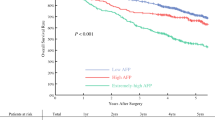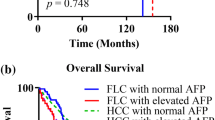Abstract
Introduction
Although preoperative α-fetoprotein (AFP) has been recognized as an important tumor marker among patients with hepatocellular carcinoma (HCC), the predictive value of AFP levels at the time of recurrence (rAFP) on post-recurrence outcomes has not been well examined.
Methods
Patients undergoing curative-intent resection of HCC between 2000 and 2017 were identified using a multi-institutional database. The impact of rAFP on post-recurrence survival, as well as the impact of rAFP relative to the timing and treatment of HCC recurrence were examined.
Results
Among 852 patients who underwent resection of HCC, 307 (36.0%) individuals developed a recurrence. The median rAFP level was 8 ng/mL (interquartile range 3–100). Among the 307 patients who developed recurrence, 3-year post-recurrence survival was 48.5%. Patients with rAFP > 10 ng/mL had worse 3-year post-recurrence survival compared with individuals with rAFP < 10 ng/mL (28.7% vs. 65.5%, p < 0.001). rAFP correlated with survival among patients who had early (3-year survival; rAFP > 10 vs. < 10 ng/mL: 30.1% vs. 60.2%, p < 0.001) or late (18.0% vs. 78.7%, p = 0.03) recurrence. Furthermore, rAFP levels predicted 3-year post-recurrence survival among patients independent of the therapeutic modality used to treat the recurrent HCC (rAFP > 10 vs. < 10 ng/mL; ablation: 41.1% vs. 76.0%; intra-arterial therapy: 12.9% vs. 46.1%; resection: 37.5% vs. 100%; salvage transplantation: 60% vs. 100%; all p < 0.05). After adjusting for competing risk factors, patients with rAFP > 10 ng/mL had a twofold higher hazard of death in the post-recurrence setting (hazard ratio 1.96, 95% confidence interval 1.26–3.04).
Conclusion
AFP levels at the time of recurrence following resection of HCC predicted post-recurrence survival independent of the secondary treatment modality used. Evaluating AFP levels at the time of recurrence can help inform post-recurrence risk stratification of patients with recurrent HCC.



Similar content being viewed by others
References
Beal EW, Tumin D, Kabir A, et al. Trends in the mortality of hepatocellular carcinoma in the United States. J Gastrointest Surg. 2017;21(12):2033–8.
Fujiwara N, Friedman SL, Goossens N, Hoshida Y. Risk factors and prevention of hepatocellular carcinoma in the era of precision medicine. J Hepatol. 2018;68(3):526–49.
Petrick JL, Kelly SP, Altekruse SF, McGlynn KA, Rosenberg PS. Future of hepatocellular carcinoma incidence in the United States forecast through 2030. J Clin Oncol. 2016;34(15):1787–94.
Tsilimigras DI, Bagante F, Moris D, et al. Defining the chance of cure after resection for hepatocellular carcinoma within and beyond the Barcelona Clinic Liver Cancer guidelines: a multi-institutional analysis of 1,010 patients. Surgery. 2019;166(6):967–74.
Pinna AD, Yang T, Mazzaferro V, et al. Liver transplantation and hepatic resection can achieve cure for hepatocellular carcinoma. Ann Surg. 2018;268(5):868–75.
Chapman WC, Klintmalm G, Hemming A, et al. Surgical treatment of hepatocellular carcinoma in North America: can hepatic resection still be justified? J Am Coll Surg. 2015;220(4):628–37.
Yang P, Si A, Yang J, et al. A wide-margin liver resection improves long-term outcomes for patients with HBV-related hepatocellular carcinoma with microvascular invasion. Surgery. 2019;165(4):721–30.
Tsilimigras DI, Moris D, Hyer JM, et al. Hepatocellular carcinoma tumour burden score to stratify prognosis after resection. Br J Surg. 2020;107(7):854–64.
Tabrizian P, Jibara G, Shrager B, Schwartz M, Roayaie S. Recurrence of hepatocellular cancer after resection: patterns, treatments, and prognosis. Ann Surg. 2015;261(5):947–55.
Shah SA, Cleary SP, Wei AC, et al. Recurrence after liver resection for hepatocellular carcinoma: risk factors, treatment, and outcomes. Surgery. 2007;141(3):330–9.
Chan AC, Chan SC, Chok KS, et al. Treatment strategy for recurrent hepatocellular carcinoma: salvage transplantation, repeated resection, or radiofrequency ablation? Liver Transpl. 2013;19(4):411–9.
Llovet JM, Zucman-Rossi J, Pikarsky E, et al. Hepatocellular carcinoma. Nat Rev Dis Primers. 2016;2:16018.
Dimitroulis D, Damaskos C, Valsami S, et al. From diagnosis to treatment of hepatocellular carcinoma: an epidemic problem for both developed and developing world. World J Gastroenterol. 2017;23(29):5282–94.
Ding HF, Zhang XF, Bagante F, et al. Prediction of tumor recurrence by α-fetoprotein model after curative resection for hepatocellular carcinoma. Eur J Surg Oncol. 2021;47(3 Pt B):660–6.
European Association for the Study of the Liver. European Association for the Study of the Liver EASL Clinical Practice Guidelines: management of hepatocellular carcinoma. J Hepatol. 2018;69(1):182–236.
Tranchart H, Chirica M, Sepulveda A, et al. Long-term outcomes following aggressive management of recurrent hepatocellular carcinoma after upfront liver resection. World J Surg. 2012;36(11):2684–91.
Poon RT, Fan ST, Lo CM, Liu CL, Wong J. Intrahepatic recurrence after curative resection of hepatocellular carcinoma: long-term results of treatment and prognostic factors. Ann Surg. 1999;229(2):216–22.
Tsilimigras DI, Mehta R, Guglielmi A, et al. Recurrence beyond the Milan criteria after curative-intent resection of hepatocellular carcinoma: a novel tumor-burden based prediction model. J Surg Oncol. 2020;122(5):955–63.
Tsilimigras DI, Bagante F, Moris D, et al. Recurrence patterns and outcomes after resection of hepatocellular carcinoma within and beyond the barcelona clinic liver cancer criteria. Ann Surg Oncol. 2020;27(7):2321–31.
Chen WT, Chau GY, Lui WY, et al. Recurrent hepatocellular carcinoma after hepatic resection: prognostic factors and long-term outcome. Eur J Surg Oncol. 2004;30(4):414–20.
Kishi Y, Saiura A, Yamamoto J, et al. Repeat treatment for recurrent hepatocellular carcinoma: is it validated? Langenbecks Arch Surg. 2011;396(7):1093–100.
Tsilimigras DI, Mehta R, Paredes AZ, et al. Overall tumor burden dictates outcomes for patients undergoing resection of multinodular hepatocellular carcinoma beyond the Milan criteria. Ann Surg. 2020;272(4):574–81.
Ho CM, Lee PH, Shau WY, Ho MC, Wu YM, Hu RH. Survival in patients with recurrent hepatocellular carcinoma after primary hepatectomy: comparative effectiveness of treatment modalities. Surgery. 2012;151(5):700–9.
Lee PH, Lin WJ, Tsang YM, et al. Clinical management of recurrent hepatocellular carcinoma. Ann Surg. 1995;222(5):670–6.
Cha C, Fong Y, Jarnagin WR, Blumgart LH, DeMatteo RP. Predictors and patterns of recurrence after resection of hepatocellular carcinoma. J Am Coll Surg. 2003;197(5):753–8.
Bhangui P, Allard MA, Vibert E, et al. Salvage versus primary liver transplantation for early hepatocellular carcinoma: do both strategies yield similar outcomes? Ann Surg. 2016;264(1):155–63.
Roayaie S, Bassi D, Tarchi P, Labow D, Schwartz M. Second hepatic resection for recurrent hepatocellular cancer: a Western experience. J Hepatol. 2011;55(2):346–50.
Trevisani F, Garuti F, Neri A. Alpha-fetoprotein for diagnosis, prognosis, and transplant selection. Semin Liver Dis. 2019;39(2):163–77.
Galle PR, Foerster F, Kudo M, et al. Biology and significance of alpha-fetoprotein in hepatocellular carcinoma. Liver Int. 2019;39(12):2214–29.
Gelli M, Sebagh M, Porcher R, et al. Liver resection for early hepatocellular carcinoma: preoperative predictors of non transplantable recurrence and implications for treatment allocation. Ann Surg. 2020;272(5):820–6.
Lee J, Joo I, Lee DH, Jeon SK, Lee JM. Clinical outcomes of patients with a high alpha-fetoprotein level but without evident recurrence on CT or MRI in surveillance after curative-intent treatment for hepatocellular carcinoma. Abdom Radiol (NY). 2020;46(2):597–606.
Author information
Authors and Affiliations
Corresponding author
Ethics declarations
Disclosure
Diamantis I. Tsilimigras, Dimitrios Moris, J. Madison Hyer, Fabio Bagante, Francesca Ratti, Hugo P. Marques, Olivier Soubrane, Vincent Lam, George A. Poultsides, Irinel Popescu, Sorin Alexandrescu, Guillaume Martel, Aklile Workneh, Alfredo Guglielmi, Tom Hugh, Luca Aldrighetti, Itaru Endo, and Timothy M. Pawlik have no conflicts of interest to declare.
Additional information
Publisher's Note
Springer Nature remains neutral with regard to jurisdictional claims in published maps and institutional affiliations.
Rights and permissions
About this article
Cite this article
Tsilimigras, D.I., Moris, D., Hyer, J.M. et al. Serum α-Fetoprotein Levels at Time of Recurrence Predict Post-Recurrence Outcomes Following Resection of Hepatocellular Carcinoma. Ann Surg Oncol 28, 7673–7683 (2021). https://doi.org/10.1245/s10434-021-09977-x
Received:
Accepted:
Published:
Issue Date:
DOI: https://doi.org/10.1245/s10434-021-09977-x




